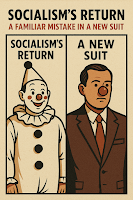Social unrest is usually explained as a clash of ideas—bad policies, worse leaders, irreconcilable worldviews. That explanation flatters everyone involved. It suggests that what we are watching is a debate, when it is often closer to a group therapy session that has wandered badly off the rails.
Long before hashtags and megaphones, Eric Hoffer noticed that mass movements tend to attract people who are not looking for a platform so much as a lifeline. Anxiety, dissatisfaction, and a vague sense of personal failure are heavy things to carry alone. A movement offers something far lighter: certainty. Right and wrong are prepackaged. Responsibility is redistributed. Confusion is replaced with slogans short enough to fit on a sign.
Once inside, behavior that would normally raise eyebrows can be reframed as moral necessity. Anger becomes courage. Destruction becomes justice. The cause supplies meaning, and meaning is addictive. Actual results, meanwhile, are optional. Belonging is the real reward.
Shared hatred does much of the bonding. Nothing unites strangers faster than a common villain, especially one vague enough to absorb every disappointment. When things go wrong—and they always do—the blame is already assigned. Personal failure is inconvenient; systemic villainy is far more efficient.
This also explains why direct confrontation so often produces the opposite of its intended effect. Opposition validates the narrative and sharpens the sense of purpose. Containment and isolation are less satisfying, but more effective. Starve the drama and the energy dissipates.
None of this is new. What is new is our determination to pretend it’s all about policy, as if human psychology politely stepped aside. It never does.

.jpg)












.png)














